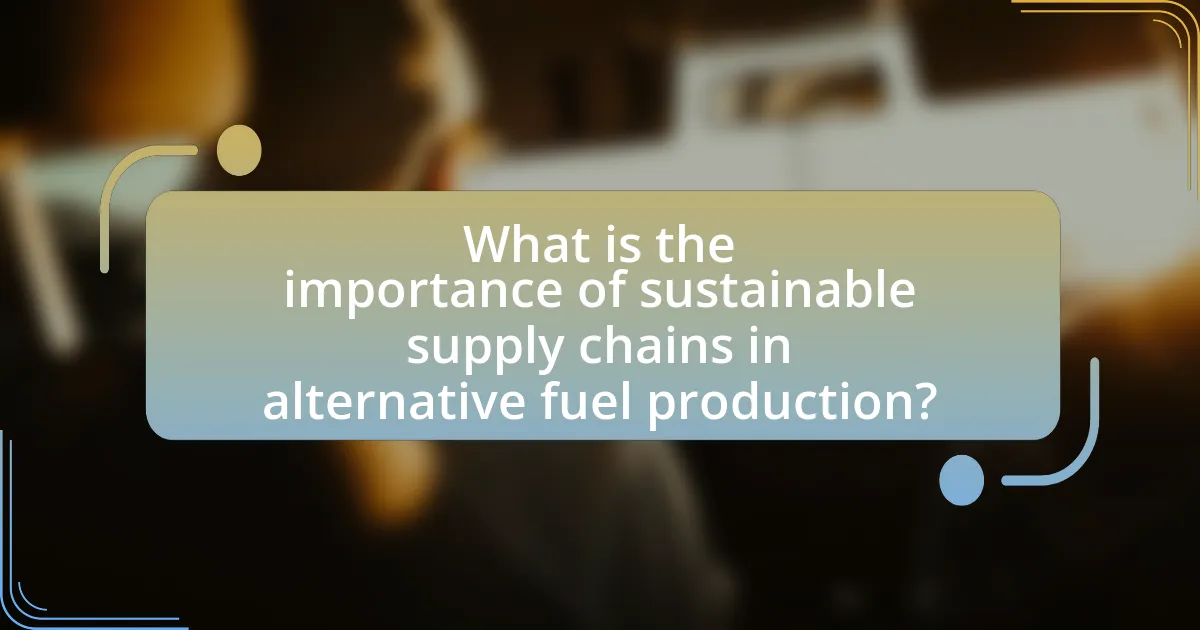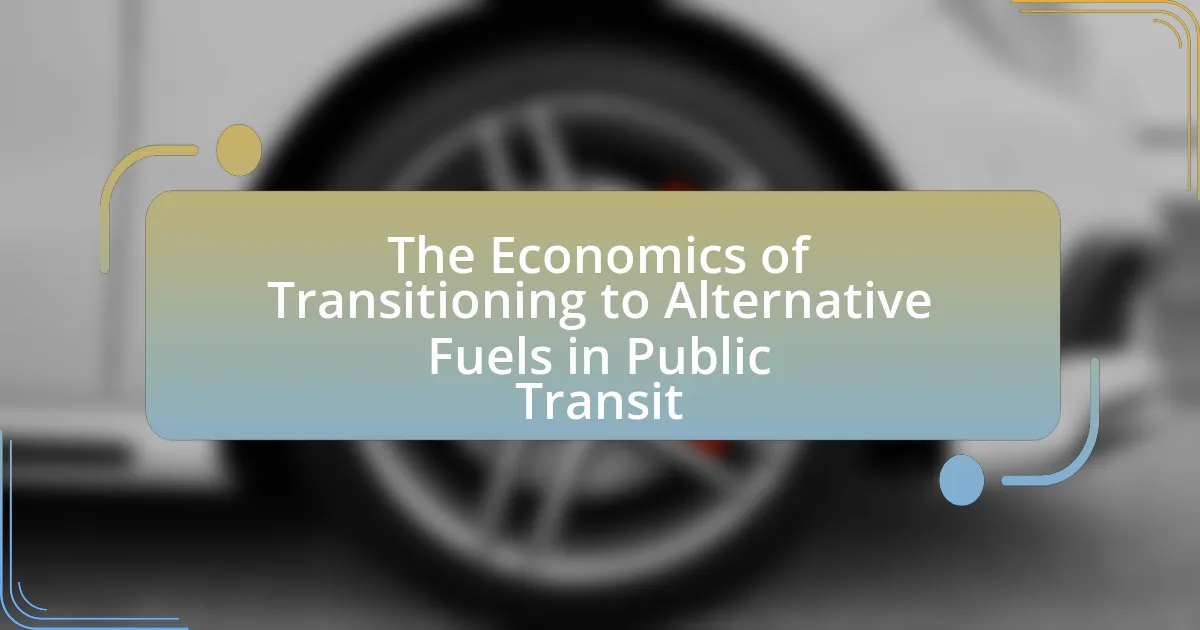Sustainable supply chains are essential in alternative fuel production, as they minimize environmental impact and enhance resource efficiency. By integrating practices such as renewable material sourcing and optimized logistics, these supply chains can significantly reduce greenhouse gas emissions and support economic viability. Key components include resource efficiency, lifecycle assessment, and stakeholder engagement, while challenges such as high initial costs and regulatory complexities must be addressed. The article explores the benefits of sustainable supply chains, including improved product quality, consumer perception, and market demand, alongside strategies for implementation and future trends in sustainability within the alternative fuel sector.

What is the importance of sustainable supply chains in alternative fuel production?
Sustainable supply chains are crucial in alternative fuel production as they minimize environmental impact while ensuring resource efficiency. By integrating sustainable practices, such as sourcing renewable materials and optimizing logistics, these supply chains reduce greenhouse gas emissions and conserve natural resources. For instance, a study by the International Renewable Energy Agency (IRENA) highlights that sustainable supply chains can lower carbon emissions by up to 30% in biofuel production processes. This not only supports climate goals but also enhances economic viability by reducing waste and improving energy efficiency.
Why are sustainable supply chains critical for the alternative fuel industry?
Sustainable supply chains are critical for the alternative fuel industry because they ensure the efficient use of resources while minimizing environmental impact. By integrating sustainable practices, the alternative fuel sector can reduce greenhouse gas emissions, conserve biodiversity, and promote social responsibility throughout the supply chain. For instance, a study by the International Renewable Energy Agency (IRENA) highlights that sustainable sourcing of raw materials can lower carbon footprints by up to 30%. This alignment with environmental goals not only enhances the industry’s credibility but also meets increasing regulatory requirements and consumer demand for greener products.
What role do sustainable practices play in reducing environmental impact?
Sustainable practices play a crucial role in reducing environmental impact by minimizing resource depletion and pollution. These practices, such as using renewable energy sources, optimizing resource efficiency, and implementing waste reduction strategies, directly contribute to lower greenhouse gas emissions and reduced ecological footprints. For instance, a study by the World Resources Institute found that adopting sustainable supply chain practices can lead to a 30% reduction in carbon emissions across various industries. This evidence underscores the effectiveness of sustainable practices in fostering environmental stewardship and promoting a healthier planet.
How do sustainable supply chains contribute to economic viability?
Sustainable supply chains contribute to economic viability by reducing costs, enhancing efficiency, and fostering innovation. By implementing sustainable practices, companies can minimize waste and energy consumption, leading to lower operational costs. For instance, a study by the World Economic Forum found that companies adopting circular economy principles can reduce costs by up to 30%. Additionally, sustainable supply chains often attract environmentally conscious consumers, increasing market share and revenue. Research from McKinsey indicates that companies with strong sustainability initiatives can outperform their peers financially, demonstrating a direct link between sustainability and economic performance.
What are the key components of sustainable supply chains in alternative fuel production?
The key components of sustainable supply chains in alternative fuel production include resource efficiency, lifecycle assessment, stakeholder engagement, and regulatory compliance. Resource efficiency ensures minimal waste and optimal use of materials, which is crucial for reducing environmental impact. Lifecycle assessment evaluates the environmental effects of alternative fuels from production to disposal, helping to identify areas for improvement. Stakeholder engagement involves collaboration with suppliers, customers, and communities to promote transparency and shared goals in sustainability. Regulatory compliance ensures adherence to environmental laws and standards, which is essential for maintaining operational legitimacy and public trust. These components collectively contribute to a more sustainable and responsible approach to alternative fuel production.
What materials and resources are essential for sustainable supply chains?
Essential materials and resources for sustainable supply chains include renewable raw materials, energy-efficient technologies, and sustainable packaging solutions. Renewable raw materials, such as bio-based feedstocks, reduce reliance on fossil fuels and minimize environmental impact. Energy-efficient technologies, like advanced manufacturing processes, lower energy consumption and greenhouse gas emissions. Sustainable packaging solutions, including biodegradable and recyclable materials, help reduce waste and promote circular economy practices. These components collectively contribute to the sustainability of supply chains, particularly in the context of alternative fuel production, where minimizing ecological footprints is crucial.
How does technology enhance sustainability in supply chains?
Technology enhances sustainability in supply chains by optimizing resource use, reducing waste, and improving transparency. Advanced technologies such as IoT (Internet of Things) enable real-time monitoring of resources, allowing companies to track and manage their consumption more efficiently. For instance, a study by McKinsey & Company found that digitizing supply chains can reduce costs by 20-30% and improve sustainability by minimizing excess inventory and energy use. Additionally, blockchain technology enhances transparency, enabling traceability of materials and ensuring ethical sourcing, which is crucial for sustainable practices. These technological advancements collectively contribute to a more sustainable supply chain by promoting efficiency and accountability.
What challenges do companies face in implementing sustainable supply chains?
Companies face several challenges in implementing sustainable supply chains, including high initial costs, lack of supplier commitment, and regulatory complexities. High initial costs arise from the investment needed for sustainable technologies and practices, which can deter companies from making the transition. Lack of supplier commitment is a significant barrier, as many suppliers may not prioritize sustainability, leading to inconsistencies in the supply chain. Regulatory complexities further complicate the situation, as companies must navigate varying environmental regulations across different regions, which can hinder the implementation of uniform sustainable practices. These challenges collectively impede the progress toward sustainable supply chains in alternative fuel production.
What are the common barriers to adopting sustainable practices?
Common barriers to adopting sustainable practices include high initial costs, lack of awareness, and insufficient regulatory support. High initial costs deter businesses from investing in sustainable technologies, as they often require significant upfront capital. Lack of awareness among stakeholders about the benefits of sustainability can lead to resistance to change, while insufficient regulatory support fails to incentivize or mandate sustainable practices. According to a report by the World Economic Forum, 70% of companies cite cost as a primary barrier, highlighting the financial challenges associated with transitioning to sustainable operations.
How can companies overcome these challenges effectively?
Companies can effectively overcome challenges in sustainable supply chains for alternative fuel production by implementing robust collaboration strategies with suppliers and stakeholders. By fostering partnerships, companies can share resources, knowledge, and best practices, which enhances efficiency and innovation. For instance, a study by the World Economic Forum highlights that collaborative supply chain networks can reduce costs by up to 15% while improving sustainability metrics. Additionally, investing in technology such as blockchain can enhance transparency and traceability in the supply chain, addressing issues related to accountability and ethical sourcing. This approach not only mitigates risks but also aligns with consumer demand for sustainable practices, ultimately leading to a competitive advantage in the alternative fuel market.

How do sustainable supply chains impact the production of alternative fuels?
Sustainable supply chains significantly enhance the production of alternative fuels by optimizing resource use and minimizing environmental impact. These supply chains prioritize renewable resources, which leads to the efficient sourcing of raw materials such as biomass and waste products for fuel production. For instance, a study by the International Renewable Energy Agency (IRENA) indicates that sustainable practices can reduce greenhouse gas emissions by up to 70% in biofuel production processes. Additionally, sustainable supply chains foster collaboration among stakeholders, ensuring that best practices are shared and implemented, which further improves the efficiency and scalability of alternative fuel production. This collaborative approach not only drives innovation but also aligns with regulatory frameworks aimed at promoting cleaner energy solutions.
What benefits do sustainable supply chains provide to alternative fuel production?
Sustainable supply chains enhance alternative fuel production by reducing environmental impact and increasing efficiency. These supply chains prioritize renewable resources, which minimizes carbon emissions and promotes the use of eco-friendly materials. For instance, a study by the World Economic Forum indicates that sustainable practices can lead to a 30% reduction in greenhouse gas emissions in supply chains. Additionally, sustainable supply chains improve resource management, ensuring that materials are sourced responsibly and waste is minimized, which is crucial for the long-term viability of alternative fuel production. This approach not only supports environmental goals but also aligns with regulatory requirements and consumer preferences for greener products.
How do they improve resource efficiency in production processes?
They improve resource efficiency in production processes by implementing advanced technologies and optimizing workflows. For instance, the integration of automation and data analytics allows for real-time monitoring and adjustments, reducing waste and enhancing productivity. According to a study by the International Energy Agency, companies that adopt such technologies can achieve up to a 30% reduction in resource consumption. Additionally, sustainable practices like recycling materials and utilizing renewable energy sources further contribute to minimizing resource use, aligning with the goals of sustainable supply chains in alternative fuel production.
What impact do they have on product quality and safety?
Sustainable supply chains significantly enhance product quality and safety in alternative fuel production. By prioritizing environmentally friendly practices and ethical sourcing, these supply chains reduce the risk of contamination and ensure that raw materials meet stringent safety standards. For instance, the use of certified sustainable biomass can lead to cleaner production processes, minimizing harmful emissions and improving the overall safety of the final fuel product. Research indicates that companies implementing sustainable supply chain practices often experience fewer product recalls and higher consumer trust, as evidenced by a study published in the Journal of Cleaner Production, which found that sustainable practices correlate with improved product integrity and safety outcomes.
How do sustainable supply chains influence consumer perception and market demand?
Sustainable supply chains significantly enhance consumer perception and increase market demand by aligning with the growing consumer preference for environmentally responsible products. Research indicates that 66% of global consumers are willing to pay more for sustainable brands, reflecting a shift in market dynamics where eco-friendly practices are increasingly valued. Companies that implement sustainable supply chains often experience improved brand loyalty and customer trust, as consumers perceive these brands as socially responsible and committed to reducing environmental impact. This perception translates into higher sales and market share, as evidenced by a Nielsen report showing that products marketed as sustainable grow 5.6 times faster than those that are not.
What role does transparency play in consumer trust?
Transparency is crucial in building consumer trust as it fosters openness and accountability between businesses and their customers. When companies provide clear information about their practices, sourcing, and sustainability efforts, consumers feel more confident in their purchasing decisions. Research indicates that 94% of consumers are likely to be loyal to a brand that offers complete transparency, as highlighted in a study by Label Insight. This level of transparency not only enhances brand reputation but also encourages consumer engagement and loyalty, ultimately leading to increased sales and long-term success.
How can companies leverage sustainability to enhance brand loyalty?
Companies can leverage sustainability to enhance brand loyalty by integrating eco-friendly practices into their operations and communicating these efforts effectively to consumers. Research indicates that 66% of global consumers are willing to pay more for sustainable brands, demonstrating a clear preference for companies that prioritize environmental responsibility. By adopting sustainable supply chains, such as sourcing alternative fuels that reduce carbon footprints, companies not only improve their operational efficiency but also align with consumer values. This alignment fosters trust and emotional connections, leading to increased brand loyalty. For instance, brands like Patagonia and Tesla have successfully built strong customer loyalty by emphasizing their commitment to sustainability, showcasing that responsible practices resonate with consumers and drive repeat business.

What are the best practices for developing sustainable supply chains in alternative fuel production?
The best practices for developing sustainable supply chains in alternative fuel production include integrating renewable energy sources, optimizing resource efficiency, and ensuring transparency throughout the supply chain. Integrating renewable energy sources, such as solar or wind, reduces reliance on fossil fuels and lowers carbon emissions. Optimizing resource efficiency involves minimizing waste and maximizing the use of by-products, which can enhance overall sustainability. Ensuring transparency allows stakeholders to track environmental impacts and make informed decisions, fostering accountability and trust. These practices are supported by studies indicating that sustainable supply chains can lead to reduced operational costs and improved brand reputation, ultimately contributing to a more resilient energy sector.
What strategies can companies adopt to ensure sustainability in their supply chains?
Companies can adopt several strategies to ensure sustainability in their supply chains, including implementing circular economy principles, optimizing logistics for reduced emissions, and engaging in supplier sustainability assessments. Circular economy practices, such as recycling materials and minimizing waste, can significantly lower resource consumption and environmental impact. For instance, a study by the Ellen MacArthur Foundation highlights that transitioning to a circular economy could generate $4.5 trillion in economic benefits by 2030. Optimizing logistics through route planning and using energy-efficient transportation can reduce carbon footprints; research from the Carbon Trust indicates that efficient logistics can cut transportation emissions by up to 30%. Additionally, conducting supplier sustainability assessments ensures that suppliers adhere to environmental standards, which can enhance overall supply chain sustainability. According to a report by McKinsey, companies that actively engage suppliers in sustainability initiatives can improve their supply chain resilience and reduce risks associated with environmental regulations.
How can collaboration with suppliers enhance sustainability efforts?
Collaboration with suppliers enhances sustainability efforts by enabling the sharing of best practices and resources, leading to reduced environmental impact. When companies work closely with their suppliers, they can implement joint initiatives such as waste reduction programs and energy-efficient technologies. For instance, a study by the World Economic Forum found that companies engaging in collaborative supply chain practices can reduce greenhouse gas emissions by up to 30%. This partnership fosters innovation in sustainable materials and processes, ultimately contributing to a more sustainable supply chain in alternative fuel production.
What metrics should be used to measure sustainability performance?
Key metrics to measure sustainability performance include carbon footprint, energy consumption, water usage, waste generation, and social impact assessments. Carbon footprint quantifies greenhouse gas emissions, providing insight into environmental impact. Energy consumption metrics assess the efficiency of energy use in production processes, while water usage metrics evaluate the sustainability of water resources. Waste generation metrics track the amount of waste produced and its management, indicating resource efficiency. Social impact assessments measure the effects of operations on communities and labor practices, reflecting the social dimension of sustainability. These metrics collectively offer a comprehensive view of sustainability performance in supply chains, particularly in alternative fuel production.
What are the future trends in sustainable supply chains for alternative fuel production?
Future trends in sustainable supply chains for alternative fuel production include increased integration of digital technologies, enhanced collaboration among stakeholders, and a focus on circular economy principles. Digital technologies such as blockchain and IoT will improve transparency and traceability in supply chains, enabling better monitoring of sustainability metrics. Collaboration among producers, consumers, and regulators will foster innovation and streamline processes, as seen in initiatives like the Biofuels Sustainability Framework. Additionally, the adoption of circular economy practices will minimize waste and promote resource efficiency, aligning with global sustainability goals. These trends are supported by research indicating that sustainable supply chains can reduce carbon footprints by up to 30% while improving economic viability.
How is innovation shaping the future of sustainable supply chains?
Innovation is transforming sustainable supply chains by integrating advanced technologies such as artificial intelligence, blockchain, and the Internet of Things (IoT). These technologies enhance transparency, efficiency, and traceability in supply chains, which are crucial for sustainable practices. For instance, AI algorithms optimize logistics and reduce waste by predicting demand more accurately, while blockchain ensures that all transactions are recorded transparently, allowing for better accountability in sourcing materials. According to a report by McKinsey, companies that adopt these innovations can reduce their carbon footprint by up to 30%, demonstrating the significant impact of technology on sustainability in supply chains.
What role will regulatory changes play in driving sustainability?
Regulatory changes will play a crucial role in driving sustainability by establishing mandatory standards and incentives that promote environmentally friendly practices. These regulations can compel industries to adopt sustainable supply chain practices, such as reducing carbon emissions and minimizing waste, which are essential for alternative fuel production. For instance, the implementation of the European Union’s Green Deal aims to make Europe climate-neutral by 2050, pushing companies to innovate and invest in sustainable technologies. This regulatory framework not only encourages compliance but also fosters competition among businesses to enhance their sustainability efforts, ultimately leading to a more sustainable economy.
What practical steps can companies take to implement sustainable supply chains in alternative fuel production?
Companies can implement sustainable supply chains in alternative fuel production by adopting several practical steps. First, they should conduct a comprehensive assessment of their current supply chain to identify areas for improvement in sustainability practices. This includes evaluating suppliers based on their environmental impact, such as carbon emissions and resource usage.
Next, companies can establish partnerships with suppliers who prioritize sustainable practices, such as using renewable energy sources and minimizing waste. Implementing a circular economy approach, where waste is reduced and materials are reused, can further enhance sustainability.
Additionally, investing in technology for better tracking and transparency in the supply chain can help companies monitor sustainability metrics effectively. For instance, utilizing blockchain technology can provide real-time data on the environmental impact of each supply chain component.
Furthermore, companies should engage in continuous training and education for their employees and suppliers about sustainable practices and the importance of reducing the carbon footprint. This can lead to a more informed workforce that actively contributes to sustainability goals.
Lastly, setting measurable sustainability goals and regularly reporting progress can help companies stay accountable and make necessary adjustments to their strategies. According to a report by the World Economic Forum, companies that integrate sustainability into their supply chains can reduce costs by up to 20% while improving their brand reputation.





